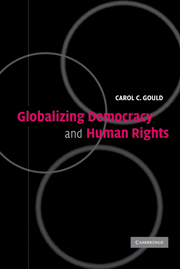Book contents
- Frontmatter
- Contents
- Acknowledgments
- Introduction: Between the Personal and the Global
- PART I THEORETICAL CONSIDERATIONS
- PART II DEMOCRACY AND RIGHTS, PERSONALIZED AND PLURALIZED
- PART III GLOBALIZING DEMOCRACY IN A HUMAN RIGHTS FRAMEWORK
- PART IV CURRENT APPLICATIONS
- 10 Democratic Management and the Stakeholder Idea
- 11 Democratic Networks: Technological and Political
- 12 Terrorism, Empathy, and Democracy
- Index
10 - Democratic Management and the Stakeholder Idea
Published online by Cambridge University Press: 23 November 2009
- Frontmatter
- Contents
- Acknowledgments
- Introduction: Between the Personal and the Global
- PART I THEORETICAL CONSIDERATIONS
- PART II DEMOCRACY AND RIGHTS, PERSONALIZED AND PLURALIZED
- PART III GLOBALIZING DEMOCRACY IN A HUMAN RIGHTS FRAMEWORK
- PART IV CURRENT APPLICATIONS
- 10 Democratic Management and the Stakeholder Idea
- 11 Democratic Networks: Technological and Political
- 12 Terrorism, Empathy, and Democracy
- Index
Summary
In this final part of the book, I take up certain outstanding contemporary social and political issues to which the previous analysis of democracy and human rights can usefully be applied. These practical contexts are normally addressed within business ethics, computer ethics, and international ethics, respectively. They concern, first, the question of democratic management in firms; second, the use of computer networks for democratic decisions; and third, ways of understanding and responding to terrorism. I believe that the framework advanced in the earlier parts of this work, in which democracy and human rights are seen to pertain to the personal, the plural, and the global, has helpful implications for applied ethics, as these three cases show. The consideration of these applications also reciprocally helps to refine and concretize aspects of the theory presented previously.
One of the key arguments in earlier chapters is that rights to democratic participation should extend broadly across society and pertain not only to entire political societies but also to smaller-scale institutions in political, economic, and social life (in addition to their crossborder applicability, discussed in Part III). One of the most controversial aspects of this claim consists in the proposed extension to economic firms. This older issue, which used to be denominated as that of “worker self-management,” remains of current interest, although it has come to be overwhelmed in importance among those critical of economic life under capitalism by the critique of economic globalization and its effects.
- Type
- Chapter
- Information
- Globalizing Democracy and Human Rights , pp. 219 - 234Publisher: Cambridge University PressPrint publication year: 2004



